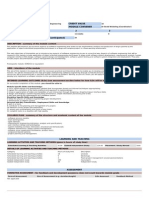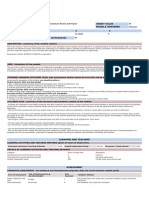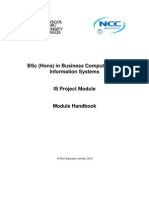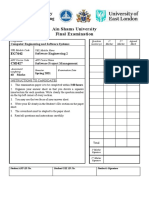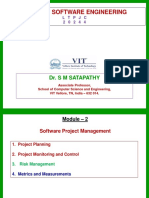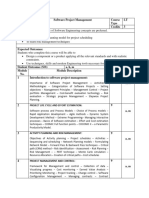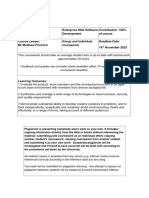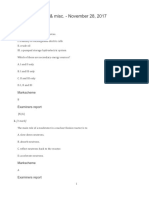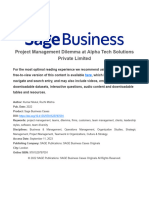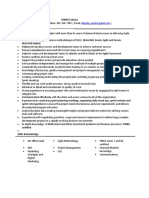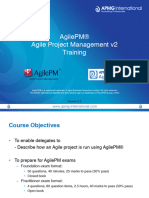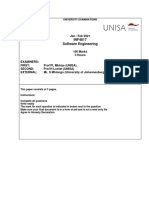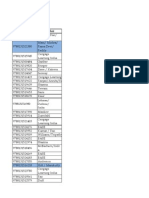BSc
Computer Science
Module Specification
Key Information
Module title Agile Software Projects
Level 5 Credit value 15
Notional study hours
Member Institution Goldsmiths 150
and duration of course
Module lead author/
Subject matter expert
Module co-author
Rationale for the module
This module aims to provide insights and practice in software development using contemporary
methods to produce software that meets the needs of users and supports an organisation’s business
function. The module will enable you to gain competence in the conceptualisation of a technology-
based solution to a real-world problem, fulfilling the requirements of users and taking constraints
imposed by the prevailing and foreseen market conditions and lessons learned from prototypes into
account.
Aims of the module
The module goals are to introduce you to a variety of topics around the practicalities of software
engineering including professional and agile practice and collaborative development. You will be given
the opportunity to present a proposal for a technical project including a structured plan for
implementing the solution using the agile development methodology and user-centred development
practices. During the whole process from concept to solution presentation, you will be required to work
in a distributed team using online collaboration, project tracking and version control tools.
�Topics covered in this module:
The topics listed here are an approximation of what will be covered. The topics presented may be
slightly revised to ensure currency and relevance. Students will be advised of any changes in
advance of their study.
1. Project management & team working
2. Requirements gathering and specification
3. Market and solutions research
4. User-centred design and prototyping
5. Project proposal
6. Agile development methodologies
7. Software testing
8. Software validation and user testing
9. Professional practice
10. Final project
Approximately 10-12 hours of study will be required per topic. The remaining study time is intended
for coursework.
Learning outcomes for the module
Students who successfully complete this module will be able to:
1. Understand and apply the agile project management process applied to software development
2. Recognise the purpose of prototypes in answering open technical questions and in designing
to meet user requirements
3. Devise technical tests and user tests to validate the functionality and performance of software
4. Work in a distributed team using appropriate online tools
5. Apply appropriate professional practices taking societal, ethical, marketing and technical
constraints into account
Assessment strategy, assessment methods
Summative and Formative Assessments
The module will contain a range of summative and formative assessments. Summative assessments
are assessments which contribute directly towards your final grade. Formative assessments do not
count directly towards your final grade. Instead, they provide you with opportunities for low stakes
practice, and will often provide some sort of feedback about your progress. For example, a practice
quiz might provide you with feedback about why a particular answer was wrong.
Assessment Activities
The table below lists the assessment activity types you might encounter taking the module. It also
states if that type of assessment can be automatically graded. For example, multiple choice quizzes
can be automatically graded, and so can some programming assignments. It also states if that type of
assessment will be found in the summative courseworks. More details about the summative
assessments are provided below.
�Assessment activity Can it be automatically graded CW1 + CW2
type with feedback in some cases?
Quiz X X
Writing task X
Programming task X X
Video task X
Peer review task X
Formative Assessment
Students will submit a progress tracking document each week detailing the contribution of each team
member to the work undertaken. This will be supported by recordings taken from online collaboration
events (video-conference, synchronous and asynchronous text exchange) and contributions to version
controlled document and code base repositories.
Pass Mark
In order to pass this module, you must achieve at least 35% in each element of summative
assessment and an overall weighted average of 40%, subject to the application of rules for
compensation. Please refer to the programme regulations for more information.
Summative Assessment Elements
This module will primarily be assessed through a substantial project carried out by students working in
small teams.
Summative Components Percentage Deadline
Assessment of final
Component credit
Coursework 1 Preliminary report 30% Mid
session
Coursework 2 Project Report and 70% End of
Software session
The main part of the assessment will be the project which will be judged by the project report, the
software, and the report of individual contribution in the form of a peer review record. Coursework 1 is
a written report which describes preliminary work undertaken on the project. Each student submits a
preliminary report which is designed to take up to 15 hours to complete. Coursework 2 comprises the
main deliverables for the project including the software and a written report describing the process of
carrying out the project and the non-software outputs. The outputs of the project (typically software)
are created by the group. The written report is written by each individual student. The written report is
designed to take up to 35 hours to write.
�
Learning resources
The module will draw on a number of different, largely web-based, public resources as well as the
resources produced as bespoke material for this module. The standard text book(s) for the module will
be:
J. Preece, Y. Rogers and H. Sharp (Fifth edition, 2019), Interaction Design: Beyond Human-
Computer Interaction, John Wiley & Sons
Rob Cole and Edward Scotcher. Brilliant Agile Project Management: A Practical Guide to Using
Agile, Scrum and Kanban (Chapter 1). Pearson 2015
